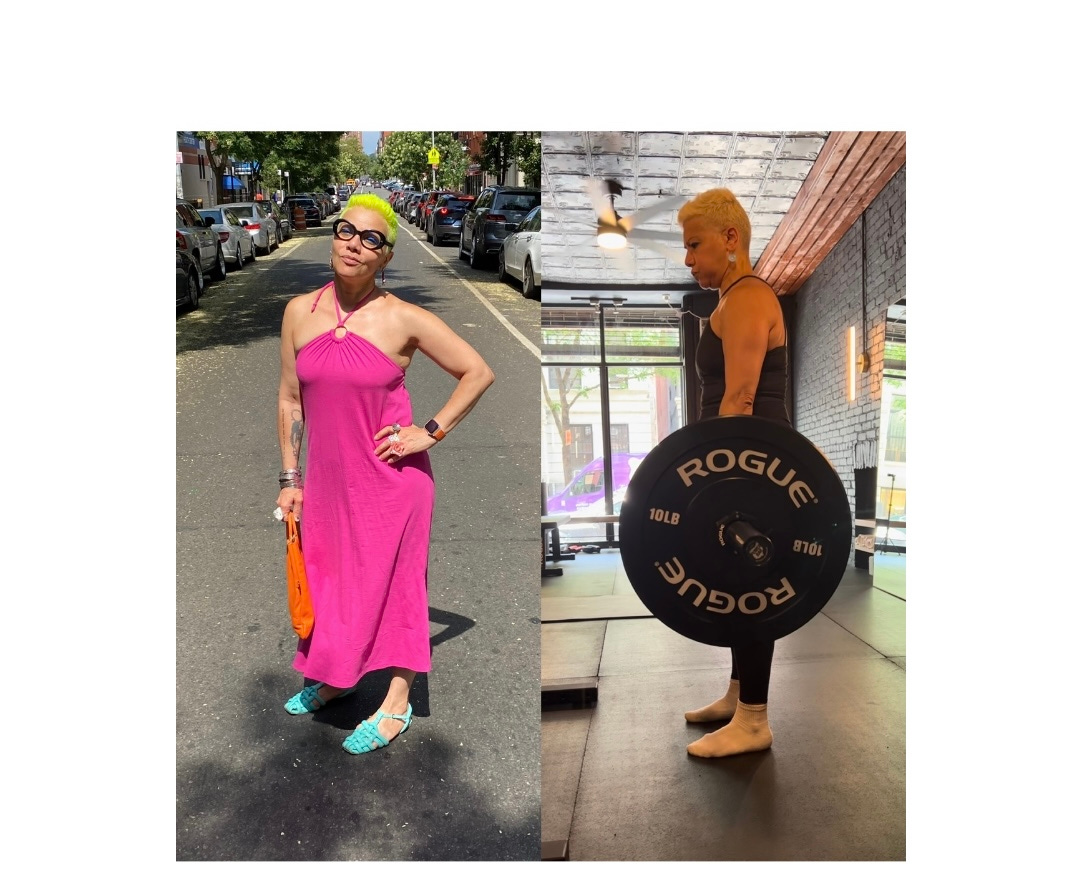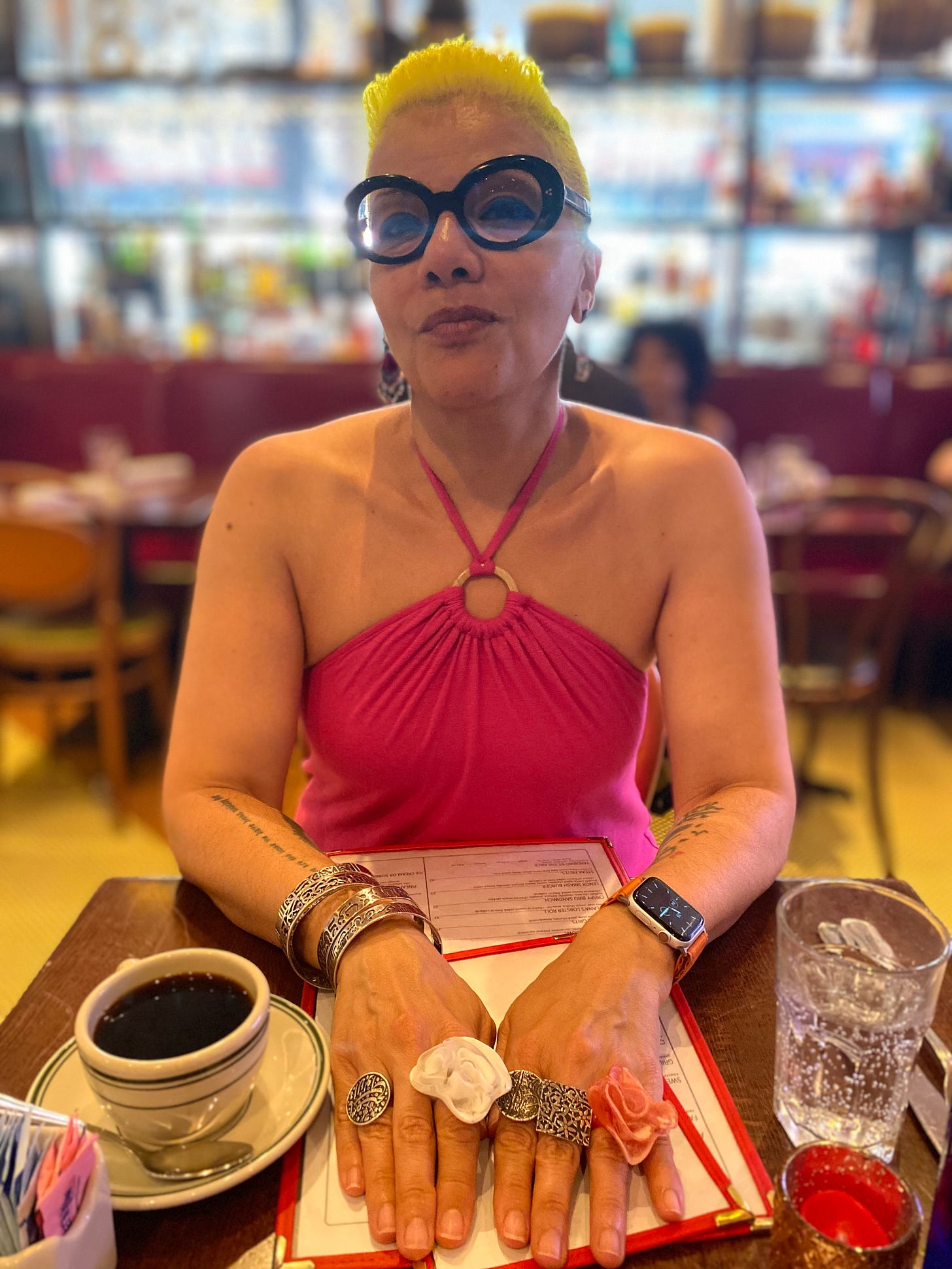Essay: Mild Whiplash
Following the Google Maps of Getting Older versus Being the Cartographer of Your Being.
Credit: (L) Robert E. Rutledge; (R) Jeana Fanelli
What does a woman who is 56 look like?
One of the reasons I share pictures of myself is that I want to grow up publicly. The phrase “grow up” is more often used to describe children moving into adolescence and then adulthood. As if adulthood is one static place, and not the (r)evolving state that it is.
What if the growing up continues and we think of it as creating the map we need rather than following the maps of others? What if it can be a map as anarchist as my heart.
I am the cartographer of my being.
In the era of GPS, it might sound quaint to talk of drafting maps when Google can show you the way. But cartography is a grand undertaking and surely mapping our beings is worthy of grandiosity.
I am drafting loudly for those who have been told to live quietly. There is nothing quiet about the forest of past fears and the hostile terrain of trauma we must zipline across if we are to continue growing up. Stitching together a bridge over waters troubled by stubborn regret deserves the crescendo of all the strum and fury.
What if the growing up continues and we think of it as creating the map we need rather than following the maps of others? What if it can be a map as anarchist as my heart.
“What is the point of writing if not to unearth things?” Annie Ernaux said. And so I dig messily because the more dirt you show the more robust the trees on the map of your being.
Digging needs strong arms and a solid back and so at the end of last October I started strength training. For my purposes today, I want to map the reverence and humility of getting older and stronger.
Guiding my terrain from 55 to 56, pain was the flashing sign on the highway of my being, forcing it to narrow for construction work necessary for expansion. It slowed me down so that I could stop running away. For years, dissociation to disrepair was a straight line.
In the era of GPS, it might sound quaint to talk of drafting maps when Google can show you the way. But cartography is a grand undertaking and surely mapping our beings is worthy of grandiosity.
It takes strength to dig messily and to dig deep and it takes getting stronger to feel pain which, weakened by dissociation, I was not strong enough to feel 12 years ago.
Rumi said the wound is where the light enters, and to that I add: and the wound is where my rage exits. The pain is uncomfortable and there is no rushing from one lane to merging into three lanes of traffic.
Like that slowing down, when I’m injured it helps to go lighter with the weights in my training, returning say to 105 lbs from 175 lbs until I have built my strength up again. What if we could think of age like that–returning to 46, say, to build up and strengthen whatever I needed at that age so that I can be stronger now at 56.
And digging messily gives you the power to break ground.
Breaking ground requires risk and there is a straight line between risk and shame and there is a straight line between brazen and breaking taboo.
Through her studies into workplace stigma around menopause, Alicia A. Grandey, Liberal Arts Professor of industrial-organizational psychology at The Pennsylvania State University, suggests that “the act of disclosing your own menopausal status conveys confidence and stability, essentially canceling out the negative biases that people would otherwise hold.”
Digging openly is powerful because as Grandey says, “to boost perceptions of leadership potential, self-disclosure is critical.”
Rumi said the wound is where the light enters, and to that I add: and the wound is where my rage exits.
Digging messily is healing.
“Being an artist means forever healing your own wounds and at the same time endlessly exposing them,” said French visual artist Anette Messager.
The wound is where the light enters, Rumi said, and it is where my rage exits, I add.
I have offered my blueprints for my menopause transition because there were so few available when the transition began me.
I know what I wrote. It is not a typo. The menopause transition began me because it has forced me to unbecome, much like that map I must do over and over because life is not static.
And what do you know: the menopause trail does not have a hard stop. i.e. once you're postmenopausal like I am, the impacts of the transition do not suddenly stop.
A week before turning 56, I woke up with a head full of shit and fucking hell fuck me, there was anxiety speeding toward me again; the anxiety that had kicked my fucking ass during the height of my perimenopause returning to taunt me. That day, lifting heavy shit at the gym was a balm.
The menopause transition began me because it has forced me to unbecome, much like that map I must do over and over because life is not static.
Four days before I turned 56, I hurt myself during one of my lifts. Anxiety was not just returning, it had crashed the barriers of my being during its U-turn.
I could not outrun it. It was like trying to drive a car with the handbrake on. And so I slowed, rolled down the window
“Get in,” I said.
“Are you here to pressure me into a fake happiness on my birthday or are you here to ensure I crack open and grow?” I ask.
“Don’t ask stupid questions,” anxiety answers.
And I get five days of this. I was born on July 28 and, in their generosity and wisdom, my parents registered me on August 1.
I will be turning 56 for five days.
When they ask me “What does a woman who is 56 look like?”
I tell them “Whatever she looks like today.”
And today, I am writing this essay slightly high on cannabis to ease the pain of my sports injury, which I’m told is mild whiplash, which I say is the perfect metaphor for the psychic injury we suffer by being forcibly jerked between what we’re told getting older should be compared to what it actually is.
Or the mild whiplash of following the Google Maps of Getting Older versus Being the Cartographer of Your Being.
Photo: Robert E. Rutledge
The more maps we create for ourselves, the freer we are to roam through our lives with the confidence and the certainty that we are whatever we are today, and in the words of June Jordan, that are tattooed on my right forearm next to Sekhmet, “We are the ones we have been waiting for.”
Create the map that guides you with confidence to the you that has been waiting for you. And then tear it up so that you can be free.
Mona Eltahawy is a feminist author, commentator and disruptor of patriarchy. She is editing an anthology on menopause called Bloody Hell! And Other Stories: Adventures in Menopause from Across the Personal and Political Spectrum. Her first book Headscarves and Hymens: Why the Middle East Needs a Sexual Revolution (2015) targeted patriarchy in the Middle East and North Africa and her second The Seven Necessary Sins For Women and Girls (2019) took her disruption worldwide. It is now available in Ireland and the UK. Her commentary has appeared in media around the world and she makes video essays and writes a newsletter as FEMINIST GIANT.
FEMINIST GIANT Newsletter will always be free because I want it to be accessible to all. If you choose a paid subscriptions - thank you! I appreciate your support. If you like this piece and you want to further support my writing, you can like/comment below, forward this article to others, get a paid subscription if you don’t already have one or send a gift subscription to someone else today.



